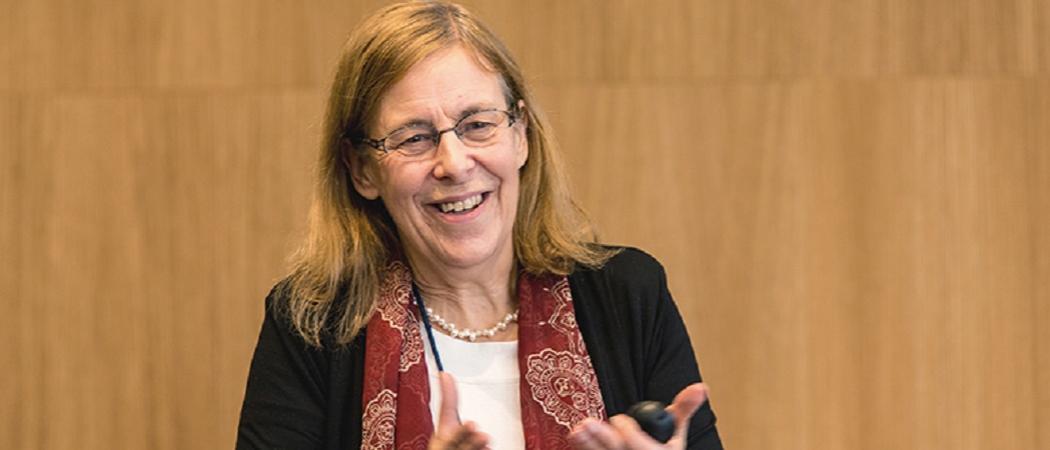The proposed cut to Horizon Europe draws further criticism, as a parliament analysis warns funding will ‘plunge below current levels’ after pandemic recovery money is spent in 2024

Janet Thornton, ERC vice president for life sciences. Photo: EBI.
EU budget commissioner Johannes Hahn has called for the budget for Horizon Europe and Erasmus+ to be safeguarded, as the European Research Council (ERC) scientific council joined a long list of organisations protesting a proposal to cut €5 billion from the 2021 - 2027 research programme.
Speaking after a meeting of European affairs ministers preparing for the budget summit of EU leaders on Friday and Saturday, Hahn hit out at the cut proposed by EU Council president Charles Michel. “We ought not to backtrack on that even one inch, one millimetre,” Hahn said.
In his attempt to steer through an agreement on the EU’s overall seven year budget, Michel has suggested Horizon Europe should have a budget of €89.4 billion (in 2018 prices), €5 billion less than the European Commission’s latest proposal.
Hahn said any cuts to programmes relevant to Europe’s economic and technological standing are “small-minded” and called on EU leaders to not get bogged down in the figures and keep broader objectives in mind.
The budget deal should “ensure that over coming years, overall, Europe will be a frontrunner and not lagging behind others in terms of its economic and technological independence,” said Hahn.
Michel’s proposal has left the entire research establishment disappointed and worried. MEPs, research associations and universities across Europe have voiced concerns about the future of European R&D.
The European Parliament also says the current structure of the proposed budget, which includes a short term spending boost from the €750 billion pandemic recovery fund, will see funding for EU programmes plunge below current levels when the pandemic fund winds down in 2024. “The long-term success of EU programmes and future investment are put at risk,” parliament budget negotiators said on Thursday.
“After analysing the draft conclusions for the 17 July EU summit, [we] warn that proposed budget cuts endanger long-term investment in research, youth or the digital sector,” they said.
There is a broad agreement among member states of the need to reach a deal this week. “But the devil is in the details,” Hahn said.
ERC Scientific Council weighs in
The Scientific Council of the European Research Council rarely gets involved in political disputes, but on Tuesday issued a statement calling on European leaders to consider the importance of research.
“The Scientific Council of the ERC has, like other members of the scientific community, watched with dismay as the ambitions for Horizon Europe have shrunk,” it says.
In 2017, an independent report argued the EU’s ninth research and innovation programme should have a budget of at least €120 billion. A year later, the commission published a plan to allocate €83.5 billion (in 2018 prices).
That figure has been cut multiple times as political priorities of EU leaders have shifted. The latest proposal is for a core budget of only €75.9 billion, boosted by a further €13.5 billion from the pandemic recovery fund, which has to be spent in the first three years of Horizon Europe. The current research programme, Horizon 2020 has a budget of €76.26 billion.
The ERC Scientific Council said the proposed €75.9 billion means in real terms that “there would be no increase to the core research and innovation budget of the EU for the first time ever.”
Janet Thornton, ERC vice president for life sciences told Science|Business the scientific council took the unanimous decision to sign the letter on Monday. “Basically, we felt that if we are going to have any impact, we are going to release the statement before the end of this week,” she said. “We are hoping that the leaders will change their minds.”
The scientific council is also worried that, with the top-up from the recovery fund, the Horizon budget puts too much emphasis on short-term investments, which may result in less money for the basic investigator-led research the ERC funds. “Often innovations arise not by mission-oriented research but because of investigator-led research,” Thornton said.
If the goal is for the EU to be prepared for future crises, both-the seven-year budget and the recovery fund should take a long-term view and continue to support fundamental research.
“We do not know what the next crisis will be, and we do not where the solutions will come from,” said Thornton. “Research is often a long-term endeavour, discoveries are serendipitous and nearly always based on long-term investigations.”
Editor's note: This article was updated 20 July at 16:15 CET.





 A unique international forum for public research organisations and companies to connect their external engagement with strategic interests around their R&D system.
A unique international forum for public research organisations and companies to connect their external engagement with strategic interests around their R&D system.